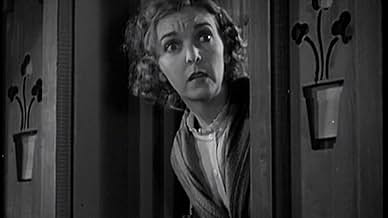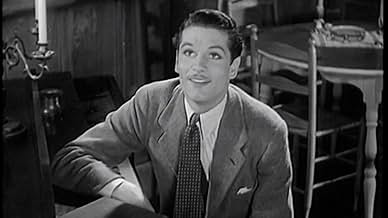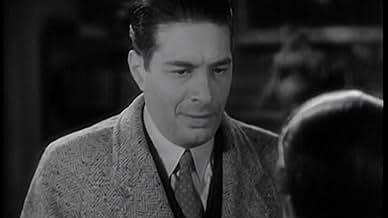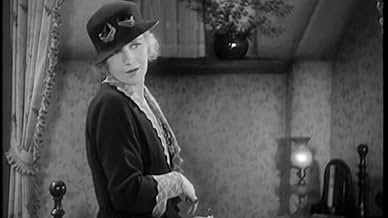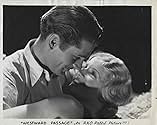A struggling writer divorces his wife to pursue his career without interference, but they meet in Europe years later after she has remarried.A struggling writer divorces his wife to pursue his career without interference, but they meet in Europe years later after she has remarried.A struggling writer divorces his wife to pursue his career without interference, but they meet in Europe years later after she has remarried.
- Director
- Writers
- Stars
Lita Chevret
- Party Guest
- (uncredited)
Joyce Compton
- Lillie
- (uncredited)
Julie Haydon
- Bridesmaid
- (uncredited)
Carl M. Leviness
- Ship Passenger
- (uncredited)
- Director
- Writers
- All cast & crew
- Production, box office & more at IMDbPro
Featured reviews
Ann Harding and Laurence Olivier are madly-in-love newlyweds who run into marital discord when she realizes he's a frustrated writer and a royal jerk. Their decision to have a child only makes things worse, and Olivier eventually abandons them. Harding turns to wealthy suitor Irving Pichel who has always loved her. Several years later, the happily married Harding runs into Olivier again. Now he's a successful writer, and attempts to rekindle their romance.
I watched this for Olivier, and he's terrible here. I'm not sure if the filmmakers wanted his character to come across as a completely repellent lout, but that's how he turned out, obnoxious, irritating and without any real redeeming qualities. I was left wondering what Harding saw in him. Olivier would give up trying to be a Hollywood star not too long after this and turn his attention to the stage where he would build his reputation. That was a good call on his part. However, this film does allow for the unlikely screen teaming of Olivier with Zasu Pitts.
I watched this for Olivier, and he's terrible here. I'm not sure if the filmmakers wanted his character to come across as a completely repellent lout, but that's how he turned out, obnoxious, irritating and without any real redeeming qualities. I was left wondering what Harding saw in him. Olivier would give up trying to be a Hollywood star not too long after this and turn his attention to the stage where he would build his reputation. That was a good call on his part. However, this film does allow for the unlikely screen teaming of Olivier with Zasu Pitts.
In the Citadel Film series book on the Films Of Laurence Olivier, Lord Olivier was not crazy about any of his movies before Wuthering Heights. But as to this film Westward Passage he was grateful to his co-star Ann Harding for being generous to a newcomer from across the pond. Maybe Ann wanted to make sure the blame went all around for this film.
Olivier came over the USA for the first time when RKO signed his then wife Jill Esmond and they found work for him as well. In this film he plays one massively egotistical struggling novelist whom you will positively hate as you see the film. He marries Ann Harding and they have a daughter who grows up in 10 years to be Bonita Granville.
Olivier embarks on a campaign to win his wife back who is now married to the earnest, but stodgy and rich Irving Pichel after Olivier literally threw her into his arms. This is after 10 years and Olivier is now a big success.
Quite frankly I found Olivier in this film to be one egotistical jerk and can't imagine why Harding isn't well glad to be rid of him. Of course I'd provide for visitation for Granville, but that's it.
Some good comedy relief is provided by Zasu Pitts playing an innkeeper. But this film is a romantic comedy that completely misfires.
Olivier came over the USA for the first time when RKO signed his then wife Jill Esmond and they found work for him as well. In this film he plays one massively egotistical struggling novelist whom you will positively hate as you see the film. He marries Ann Harding and they have a daughter who grows up in 10 years to be Bonita Granville.
Olivier embarks on a campaign to win his wife back who is now married to the earnest, but stodgy and rich Irving Pichel after Olivier literally threw her into his arms. This is after 10 years and Olivier is now a big success.
Quite frankly I found Olivier in this film to be one egotistical jerk and can't imagine why Harding isn't well glad to be rid of him. Of course I'd provide for visitation for Granville, but that's it.
Some good comedy relief is provided by Zasu Pitts playing an innkeeper. But this film is a romantic comedy that completely misfires.
No one can deny that Ann Harding was something to look at, and that is about all this film has to offer. Her co-star is a very young mustachioed Laurence Olivier working very hard to make something of an unconvincingly written character -specifically, a high-strung novelist who resents churning out hack material for quick money to pay the bills while living in a small apartment with his wife (Harding) and a baby daughter. Eventually he can take no more, divorces his wife and goes off to write what he pleases in peace, leaving his wife to marry a long-time admirer (Irving Pichel) who provides her with money and status even though she is not in love with him. Years later the estranged couple meets again in Lucerne. By now he is a successful and famous novelist and impulsively decides to wrest back the woman he had deserted. Throughout the proceedings they bicker and make up with tiring frequency. The movie is mostly talk in the Noel Coward style but without the Coward sparkle. The fights and reconciliations, including the reuniting of a divorced couple at a classy resort, are very reminiscent of Coward's "Private Lives" which had been filmed with disastrous results the year before. As in "Lives," the couple even plays and sings a song from time to time, in this case "What'll I Do?" In short, this is good if you like watching Harding, a great screen beauty, and examining the meticulous craftsmanship of Olivier. Otherwise it's a leaden and witless talkathon.
The trouble with this film is the character played by Laurence Olivier. In the words of other characters in the movie, he is "selfish, self-centered, conceited and egotistical." I would add brash, argumentative and stubborn. In short, I hated his character, which ruined the film for me, even though without those qualities there would not have been a film. Apparently, 1932 audiences agreed with me; Olivier was persona non grata at RKO after this film lost $250,000 at the box office. Olivier went back to England and didn't make another film in America until Wuthering Heights (1939), when his talents were much more appreciated.
Besides being an early film of Olivier, this film is also noted for being the film debut of Bonita Granville, then ten years old. She gives a good performance, and you can see she is a natural born actress. The always lovely Ann Harding is also worth seeing, as well as Florence Lake and Edgar Kennedy, who have a nice bit of comic relief in one short scene aboard ship.
Besides being an early film of Olivier, this film is also noted for being the film debut of Bonita Granville, then ten years old. She gives a good performance, and you can see she is a natural born actress. The always lovely Ann Harding is also worth seeing, as well as Florence Lake and Edgar Kennedy, who have a nice bit of comic relief in one short scene aboard ship.
Studios must have known the value of naming a film correctly, but in the case of Pathe, they called this one Westward Passage, which sounds like a bunch of people on a wagon train.
Actually it's a film about a modern (1932) young married couple, played by Ann Harding and Laurence Olivier.
I thought this might be a play for a couple of reasons. First is the amount of dialogue and secondly, it was third class Noel Coward and probably trying to cash in on Private Lives.
The story concerns a writer, Nicholas (Olivier) who marries Olivia (Ann Harding). It seems as if five minutes after the honeymoon, the two start quarreling on a hourly basis.
They live in a small apartment; Nicholas' publisher is demanding that he change the end of his novel, and he's refusing and loses his temper; and then she hits him up with the fact that she's pregnant, which he wasn't planning on.
Eventually, they divorce. Olivia marries Harry, who adores her and has money, though she's not in love with him. Hers and Nicholas' little girl (Bonita Granville) accompanies her.
A few years later, in Lucerne, Olivia happens by a bookstore selling Nicholas' book, and Nicholas, exiting, hands her a copy. He's now successful and decides he wants her back. He even takes passage (get it? westward passage) on a ship she's traveling on without her husband.
This isn't very good. Olivier, wearing odd eye makeup, hadn't learned acting before the cameras yet, so he's over the top. He wouldn't learn it until Wuthering Heights when, before the cast, he said, "I suppose this anemic little medium can't take great acting," which sent director William Wyler, the cast, and crew into spasms of laughter.
He's high energy, probably trying to cover up for the fact that his part isn't well written. A friend of mine used to take a line from Rebecca, "I hated her," and imitate Olivier, going into falsetto on "hated." Ever since then, I've noticed when Olivier gets excited, his voice goes up an octave at least in his youth.
Ann Harding is lovely. Unfortunately the film is beneath both of them. Olivier was destined to become one of the greatest actors in both theater and film, not to mention one of the most glorious looking. The elegant Harding eventually moved into character roles, working into the 1960s.
These actors are always worth seeing, provided you can make it through this somewhat boring movie.
Actually it's a film about a modern (1932) young married couple, played by Ann Harding and Laurence Olivier.
I thought this might be a play for a couple of reasons. First is the amount of dialogue and secondly, it was third class Noel Coward and probably trying to cash in on Private Lives.
The story concerns a writer, Nicholas (Olivier) who marries Olivia (Ann Harding). It seems as if five minutes after the honeymoon, the two start quarreling on a hourly basis.
They live in a small apartment; Nicholas' publisher is demanding that he change the end of his novel, and he's refusing and loses his temper; and then she hits him up with the fact that she's pregnant, which he wasn't planning on.
Eventually, they divorce. Olivia marries Harry, who adores her and has money, though she's not in love with him. Hers and Nicholas' little girl (Bonita Granville) accompanies her.
A few years later, in Lucerne, Olivia happens by a bookstore selling Nicholas' book, and Nicholas, exiting, hands her a copy. He's now successful and decides he wants her back. He even takes passage (get it? westward passage) on a ship she's traveling on without her husband.
This isn't very good. Olivier, wearing odd eye makeup, hadn't learned acting before the cameras yet, so he's over the top. He wouldn't learn it until Wuthering Heights when, before the cast, he said, "I suppose this anemic little medium can't take great acting," which sent director William Wyler, the cast, and crew into spasms of laughter.
He's high energy, probably trying to cover up for the fact that his part isn't well written. A friend of mine used to take a line from Rebecca, "I hated her," and imitate Olivier, going into falsetto on "hated." Ever since then, I've noticed when Olivier gets excited, his voice goes up an octave at least in his youth.
Ann Harding is lovely. Unfortunately the film is beneath both of them. Olivier was destined to become one of the greatest actors in both theater and film, not to mention one of the most glorious looking. The elegant Harding eventually moved into character roles, working into the 1960s.
These actors are always worth seeing, provided you can make it through this somewhat boring movie.
Did you know
- TriviaTheatrical movie debut of Bonita Granville (Little Olivia Allen (age 10)).
- GoofsNick's telegram congratulating Olivia and Harry on their marriage is dated May 10 1928. Later scenes are supposed to take place six years later, despite the film having been released in 1932.
- ConnectionsReferenced in The Complete Citizen Kane (1991)
- SoundtracksThe Wedding March
(uncredited)
from "A Midsummer Night's Dream"
Music by Felix Mendelssohn
Played by Laurence Olivier on the piano
Details
- Runtime1 hour 13 minutes
- Color
- Aspect ratio
- 1.37 : 1
Contribute to this page
Suggest an edit or add missing content

